 Petzlover
Petzlover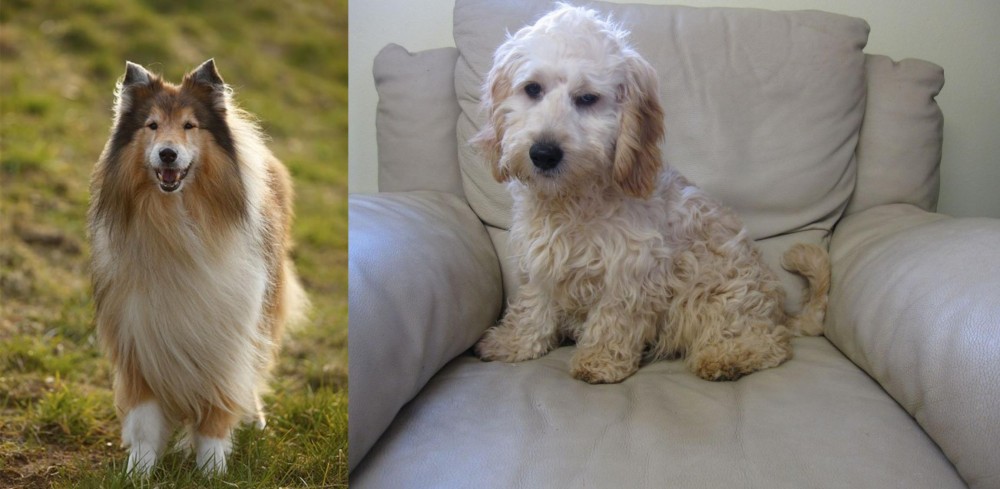 Collie is originated from United Kingdom but Cockachon is originated from United States. Collie may grow 22 cm / 9 inches higher than Cockachon. Collie may weigh 20 kg / 45 pounds more than Cockachon. Both Collie and Cockachon has almost same life span. Collie may have more litter size than Cockachon. Collie requires Moderate Maintenance. But Cockachon requires Low Maintenance
Collie is originated from United Kingdom but Cockachon is originated from United States. Collie may grow 22 cm / 9 inches higher than Cockachon. Collie may weigh 20 kg / 45 pounds more than Cockachon. Both Collie and Cockachon has almost same life span. Collie may have more litter size than Cockachon. Collie requires Moderate Maintenance. But Cockachon requires Low Maintenance
 The Collie is a herding dog from Scotland and is also known by other names such as Rough Collie or Lassie Collie.
The Collie is a herding dog from Scotland and is also known by other names such as Rough Collie or Lassie Collie.
The first Collies used to be more in size as today’s Border Collies and they were also essentially black. Queen Victoria stepped in to save the Collie from obscurity, bringing some back to England where their popularity soared.
The looks started changing as they were bred and in 1860 they were shown at a dog show in Birmingham, England as ‘Scotch Sheep Dogs’.Later on the sable coat color was introduced.
In 1879 the first Collie was imported to the United States and a club for the dog breed was formed in 1886.
 The Cockachon is not a pure bred dog but rather a cross between the Cocker Spaniel and the Bichon Frise. Very little if anything is known about who initially developed the Cockachon. It is known that the International Designer Canine Association (IDCA)registered and recognized the hybrid in 2009.
The Cockachon is not a pure bred dog but rather a cross between the Cocker Spaniel and the Bichon Frise. Very little if anything is known about who initially developed the Cockachon. It is known that the International Designer Canine Association (IDCA)registered and recognized the hybrid in 2009.
It is obviously a relatively new cross breed. The hybrid is also recognized by the American Canine Hybrid Club (ACHC), International Designer Canine Registry (IDCR) and the Designer Dog Kennel Club (DDKC).
 The modern Collie is a medium to large sized dog that stands at 51 – 61cm and weighs between 20 – 29kg. You could say that the popularity of the Collie grew because of the dog Lassie, a Rough Collie dog in the film ‘Lassie Come Home’. People who saw this film learned what a wonderful pet the dog could be.
The modern Collie is a medium to large sized dog that stands at 51 – 61cm and weighs between 20 – 29kg. You could say that the popularity of the Collie grew because of the dog Lassie, a Rough Collie dog in the film ‘Lassie Come Home’. People who saw this film learned what a wonderful pet the dog could be.
The Collie has two looks – the full coat which is known as the Rough Collie and the shorter coated Collie known as the Smooth variety. The coat comes in different colors but is essentially tri-colored in white, tan and black tips. The Collie has erect ears and a long, feathery tail.
Temperament of a dog is affected by a number of factors, including lifestyle of owners, heredity as well as whether the dog had training and socialization.
The Collie is a good-natured, friendly dog with no aggressiveness in him. He adapts well to city and country life, so long as he is with his human family, but he will need lots of exercise.
He will do well with training and socialization, turning into an even more splendid pet than he already is. He loves the children in the home and loves playing with them and watching over them. The Collie is intelligent and loyal and is easily trained.
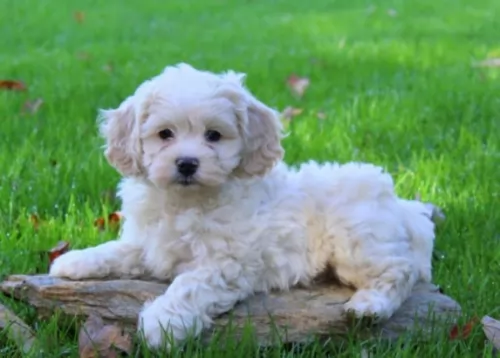 The Cockachon is a cute, little dog very popular in current times. He is small, compact, dark eyes, a round head and black nose. He has a baby face and fluffy hair. It has a furry tail and a blunt muzzle.
The Cockachon is a cute, little dog very popular in current times. He is small, compact, dark eyes, a round head and black nose. He has a baby face and fluffy hair. It has a furry tail and a blunt muzzle.
The Cockachon is a mix between the American Cocker Spaniel and the Bichon Frise. In order to get a better idea of what the hybrid can look like just look at the individual parents. The American Cocker Spaniel is a small dog with a short muzzle and domed head. It is in the Sporting Group, but it is the smallest member of the group. He has a compact, sturdy body and though domed his head is refined.
The Cocker’s stance includes a sloping topline, muscular hindquarters and strong shorter legs adds up to a balanced canine. The coat can be in a wide variety of colors including liver, golden, black, and red. Also, it could be liver and tan, black and tan, roan or tricolors. So, while the Bichon Frise is always white the Cockachon can be any of these colors including white. The types of coats that the Cocker Spaniel and the Bichon Frise have are very different as well.
The Bichon Frise is also a small dog, actually smaller than the American Cocker. The Cockachon usually ends up being about the size of the Bichon at 5-10 kg in weight and 23-30 cm in height. The skull of the Bichon Frise is round rather than domed and the muzzle is also rounded. The tail is long and curly while the Cocker would usually have a cropped tail. The nose and eyes of the Bichon Frise are black and its hair is dense and curly. Unlike the Cocker Spaniel it barely sheds.
Many Cockachon have floppy ears, curly coats and come in any variety of colors though many, many are white.
 Your Collie is an intelligent dog who will need physical exercise as well as mental stimulation too, otherwise he can develop some destructive behavior patterns that could be avoided just by seeing to his exercise needs.
Your Collie is an intelligent dog who will need physical exercise as well as mental stimulation too, otherwise he can develop some destructive behavior patterns that could be avoided just by seeing to his exercise needs.
He is easy to train and is a sensitive dog, wanting to learn and wanting to please.
A well trained Collie makes a wonderful pet. He is such a loyal dog that he will go to the ends of the earth for his owner, and guarantees to be every bit as affectionate, brave and loyal as the film-star dog, Lassie.
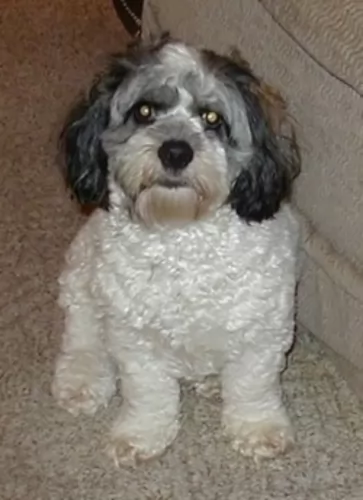 People created the Cockachon to get a small, lap or carry dog that had certain characteristics. These characteristics included a very social, loving dog. He is active and friendly, sweet and gentle. He is loyal, and loves being loved. He is great with other dogs and you can trust him with your children. He is a little independent but very loyal.
People created the Cockachon to get a small, lap or carry dog that had certain characteristics. These characteristics included a very social, loving dog. He is active and friendly, sweet and gentle. He is loyal, and loves being loved. He is great with other dogs and you can trust him with your children. He is a little independent but very loyal.
Like many little dogs he can have serious separation anxiety. Crate training is recommended so that he has a place to feel safe when you are not with him.
 The Collie is a healthy dog breed generally, but just like with all other dogs, they are also prone to certain health conditions. It’s not to say that your Collie will get these diseases, but it can be beneficial to you and your pet’s health to be aware of them if you’re looking at the Collie as a pet.
The Collie is a healthy dog breed generally, but just like with all other dogs, they are also prone to certain health conditions. It’s not to say that your Collie will get these diseases, but it can be beneficial to you and your pet’s health to be aware of them if you’re looking at the Collie as a pet.
This is a condition where the skin of the nose peels and oozes and left untreated, it can be painful for your pet and could even lead to cancer.
This is an inherited eye disease that can actually lead to blindness. When certain parts of the eye don't develop properly it can lead to CEA - a genetic disease found in Collies as well as other dog breeds. The disease is also known as Choroidal Hypoplasia and brings about changes and abnormalities in the eye.
This is an abnormal formation of the hip socket and certainly dogs with hip dysplasia should never be bred as it can lead to pain and lameness.
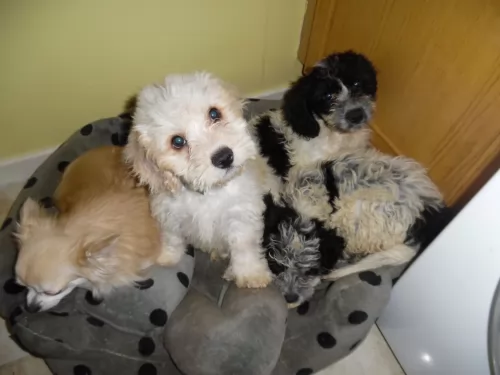 Hybrid dogs seldom have a lot of inherited diseases as they seem to jump a generation but if they do, it can be either a combination of both breeds issues or issues from just one of the breeds in the cross. For the Cockachon these issues include:
Hybrid dogs seldom have a lot of inherited diseases as they seem to jump a generation but if they do, it can be either a combination of both breeds issues or issues from just one of the breeds in the cross. For the Cockachon these issues include:
This loose kneecap issue is common to many small dogs and can cause lameness if not addressed.
Eyelid problems such as the ones that might bother a Cockachon can be found in many small dogs. These include Entropion and Ectropion.
 The Collie will need grooming because of his long hair, and you will need to brush it at least twice a week to rid it of loose hairs and to keep it free from tangles. This is especially important if you live in the country and he leads an active lifestyle running through fields.
The Collie will need grooming because of his long hair, and you will need to brush it at least twice a week to rid it of loose hairs and to keep it free from tangles. This is especially important if you live in the country and he leads an active lifestyle running through fields.
Keep a constant check on your Collie’s ears because dirt build-up can lead to an ear infection. Your vet can advise you on how to clean your dog’s ears. Make sure you have your Collie’s nails trimmed.
To cater for your Collie’s size and activity levels, make sure to feed him good food that meets his nutritional needs. Protein is the most important nutritional need for dogs, and apart from feeding your dog quality kibble, protein should also come from raw, animal-based sources such as meat, fish and poultry.
You can also include some cooked brown rice, vegetables and cooked chicken to provide variety. Make sure he always has fresh, cool water available.
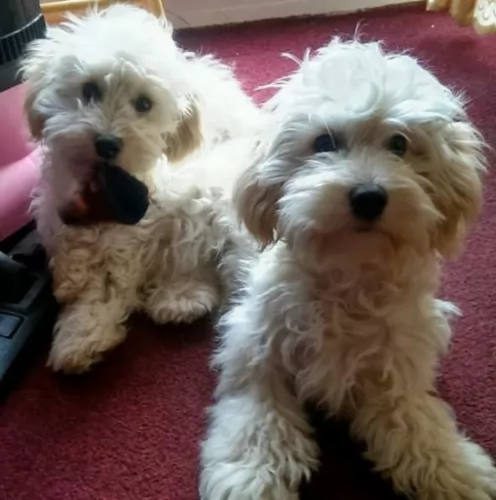 Don’t overfeed a Cockachon. Give him ¾ -1.5 cups of dry food of high quality in two meals per day.
Don’t overfeed a Cockachon. Give him ¾ -1.5 cups of dry food of high quality in two meals per day.
In addition to the issues listed above, the Cockachon is also prone to heart disease and cardiac issues.
The Cockachon has a lot of energy for its size. Make sure it gets plenty of exercise. If walks are the exercise of your choice make sure you walk him for 30 minutes a day. He loves to play, and a back yard would be nice. These little guys do well in obedience but are usually to small for agility.